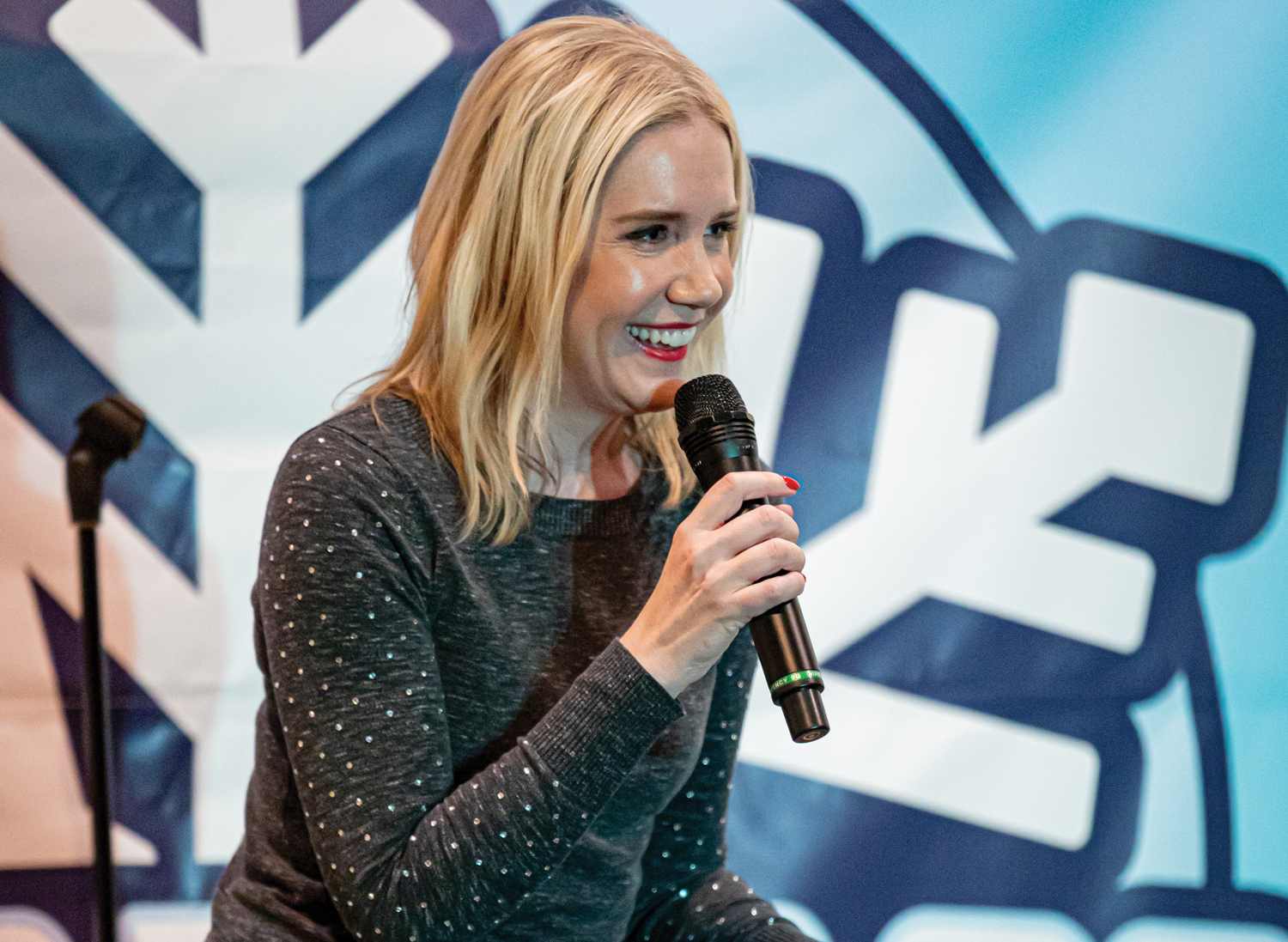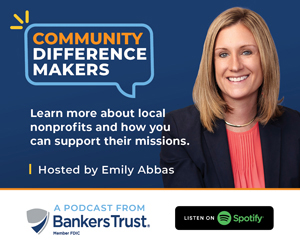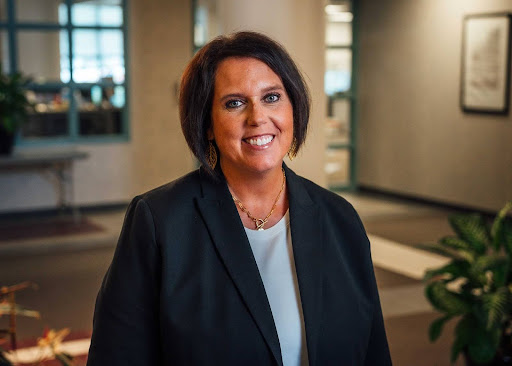The ‘growth mindset’
Using failure as motivation to learn

Lisa Rossi Apr 7, 2023 | 6:00 am
6 min read time
1,368 wordsAll Latest News, Arts and Culture, Book Review, Business Record InsiderThe little boy stood trembling over the side of the pool, refusing to jump in.
His coach begged. “Come on! You can do it!”
Finally, he did it. Then he pulled himself back to the side of the pool and then he did something that surprised me.
He jumped back in. And then he did it again. And again.
What once frightened him now fascinated him.
I watched from the other side of the pool where my children were swimming. I wiped the tears from my face because the same phenomenon was happening in my life.
I was in the process of transitioning from a daily news reporter and editor to a stand-up comedian. And every time I got up on stage, it felt like I was jumping into a cold pool for the very first time. And yet I kept going back, kept trying in the face of failures, hecklers, even stone-cold silence.
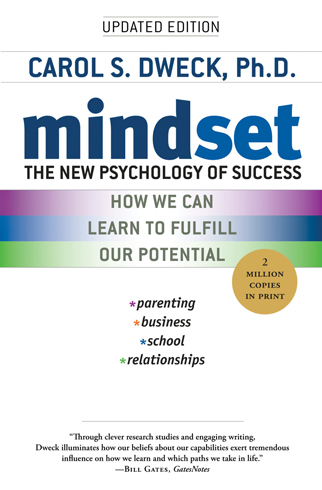
There were many factors that kept me motivated to keep jumping in the metaphorical comedy pool, but a big influence in my journey was the book “Mindset” by Stanford psychologist Carol Dweck, which is about the growth mindset. I discovered the book during a 2017-18 academic yearlong fellowship at Stanford University. I was there to seek solutions to reinvent journalism but what I did instead was reinvent myself.
What is the growth mindset?
Dweck writes that the growth mindset is “based on the belief that your basic qualities are things you can cultivate through your efforts, your strategies and help from others.” Everyone, Dweck writes, “can change and grow through application and experience.” Everyone? That was a radical idea to me. I came to Stanford from workplaces that relied on the idea of talent, at least in my interpretation. You either had it or you didn’t.
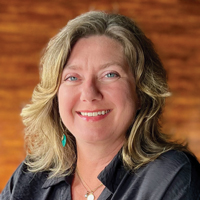
Megan McKay, the founder and CEO of Peace Tree Brewing Co., has taught her staff the growth mindset with the goal of getting them to think more expansively.
“If they’ve grown up in a small town and haven’t been out and about a lot, they think they are going to join a company and do one job,” she said. “[It’s] just giving them that permission to think about – what could I learn, or change, or do? What are the opportunities?”
Debunking the idea that talent is the only path to success, McKay describes the growth mindset this way for her employees: When they say they don’t know how to do something, simply add the word “yet” to that statement.
“It’s been really fun as we’ve had meetings, they catch themselves: ‘I don’t know how to do that.’ And then they look at me, and go ‘Oh, yet.’”
The impact on her staff has been an increase in confidence and thinking of solutions instead of just “coming up with a problem,” McKay said. “It’s pretty transformative when they can buy into that.”
For me, I needed the growth mindset to fuel a career change. I applied to Stanford with a big question mark about whether daily newsrooms were adequately connecting with their communities. The larger question was about me: Was I still connecting with this kind of work?
Dweck urges her readers to stretch their abilities past where they are comfortable, going beyond the “tried and true.” I had been a breaking news journalist for almost 20 years, starting at age 16 at a newspaper near my hometown in rural Iowa. In my career up to that point, I had covered murders, fires, hurricanes, floods, I even did on-site reporting in New York City in the immediate aftermath of 9/11. I had seen a lot. And I wanted something different out of my life.
Dweck’s words fueled me as I began an exploration of the world outside of daily journalism. She writes that “we all have interests that can blossom into abilities.”
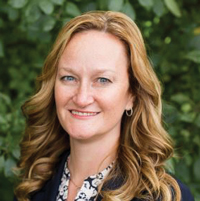
Erica Vonk, an assistant professor in business and economics at Northwestern College in Orange City, has used the growth mindset at work and at home, too, in her journey as a foster parent. She confronted fixed mindset attitudes toward what a traditional family looks like.
“Yesterday we actually adopted our 31-year-old foster daughter,” said Vonk, who is also the director of the Center for Innovation and Leadership at Northwestern. “We made it official. People don’t understand, why would you adopt an adult? So just being able to share that story shows people a different perspective, a different mindset of the definition of family they’ve had before.”
As a reporter, I never took the time to cultivate interests outside of work, or new abilities, like Vonk and her experiences as a foster parent. When I went to Stanford, I finally allowed myself to take a breath.
And so I took a comedy class. I started laughing and I couldn’t stop. It felt unbelievably good.
Dweck advises having a network of support when seeking new levels of achievement. So at the end of my fellowship, I made a promise to my fellowship cohort for which I hoped they’d hold me accountable. I would not give up comedy.
Fixed versus growth mindset
To do this, I needed an understanding of the differences between a fixed mindset and the growth mindset. In a fixed mindset, Dweck writes, the belief is that intelligence is static. A growth mindset is the belief that intelligence can be developed.
So I sought to develop my comedy intelligence. I took improv comedy classes in cold back rooms around Des Moines, and traveled to Chicago to take classes from the Second City. And finally, I started taking online classes from the Groundlings, a world-famous comedy school in LA, and the American Comedy Institute in New York, which coaches emerging stand-up comedians.
Those operating under a fixed mindset avoid challenges. The growth mindset urges you to embrace challenges.
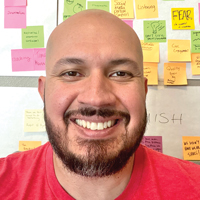
James Altamirano, resident intrapreneur and human-centered innovation leader at Principal Financial Group, says when it comes to approaching fellow leaders who are operating under a fixed mindset, you can’t change someone until you’ve taken the time to understand them.
“I don’t think you have people with a growth mindset and people with a fixed mindset,” he said. “I think you have humans who at different times wear any of those mindsets. Myself included. I’m constantly fighting off my own fixed mindset.”
I had to fight off my own fixed mindset to push for more of a challenge. So I signed up for a local open mic. People didn’t laugh at my jokes.
This is where Dweck talks about failure. She writes that growth mindset leaders find failure motivating. If you are operating under a fixed mindset, those setbacks label you.
Sydney Conrad-Cook, who lives in Van Meter and works remotely as a strategic innovation director at USAA, said embracing the growth mindset has helped her be more confident.
“It’s definitely helped me be more grounded and rooted when a challenge comes up and really thinking about not trying to internalize that as a failure on my part, but looking for the feedback and coming up with an ‘and then what’s next?’ How do we move forward?”
I used that philosophy to motivate myself to keep showing up to open mics, keep trying out new material, working to discover what made people laugh, as opposed to labeling myself a “bad comedian” when I didn’t.
Since my first open mic in November of 2019, I’ve sought ever higher levels of achievement in comedy, with the help of Dweck and my network of support. I’ve performed in New York, New Orleans, Los Angeles, and countless times in Des Moines, Omaha and Iowa City. I performed on the Groundlings Main Stage in Los Angeles this summer in a sketch comedy show, a life bucket list moment. Dweck has great advice for anyone who has successfully used the growth mindset to seek ever higher levels of achievement: Keep setting goals for growth. She challenges you to ask yourself these questions every day:
“What are the opportunities for learning and growth today? For myself? For the people around me?”
And “When, where and how will I embark on my plan?”
Lisa Rossi is a freelance contributing writer.

